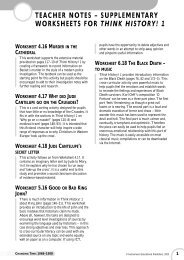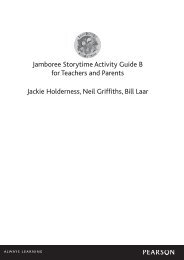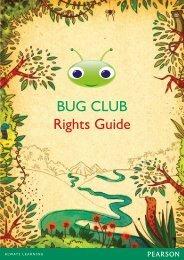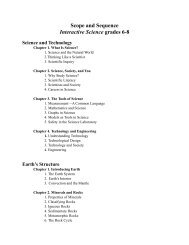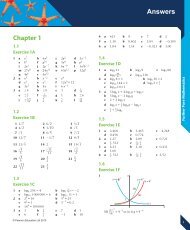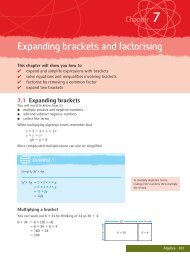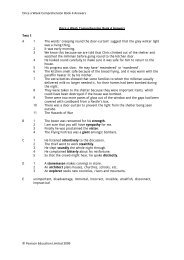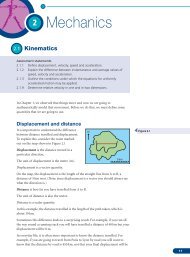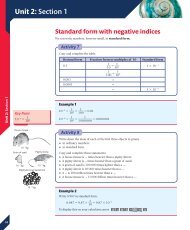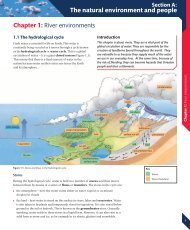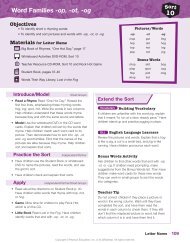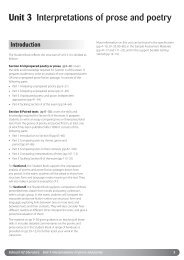Theory of Knowledge Chapter 2 - Pearson Global Schools
Theory of Knowledge Chapter 2 - Pearson Global Schools
Theory of Knowledge Chapter 2 - Pearson Global Schools
Create successful ePaper yourself
Turn your PDF publications into a flip-book with our unique Google optimized e-Paper software.
Downloaded from www.heinemann.co.uk/ibWhat is knowledge?The quest for knowledge2How did I come to know what I know about the world and myself? Whatought I to know? What would I like to know that I don’t know? If I wantto know about this or that, where can I get the clearest, best and latestinformation? And where did these other people about me get their ideas aboutthings, which are sometimes so different from mine?H.G. WellsIt is said from time to time that ignorance is bliss, but this is not so. The pattern <strong>of</strong>our lives as students and teachers involves us in years <strong>of</strong> schooling and sometimesyears <strong>of</strong> continued struggle to master a discipline and gain a reputation in the publicrealm. Or, at the personal level, to find out what is worth knowing and what is worthforgetting. Francis Bacon, an Elizabethan philosopher, believed that knowledge is powerand, whether you believe that or not, the quest for knowledge is endless and daily. Onecould almost say that it is part <strong>of</strong> the human condition.All men by nature desire to know.AristotleWhat is knowledge? sounds simple enough. We all know roughly what it is to know andto be correct; to be wrong, to doubt and to be only partially right. If you’ve thoughtabout knowledge at all, you may hold some view close to what can be called the ‘TrivialPursuit’ model. That is, knowledge is seen as facts which are more or less simple,discrete, non-controversial and displayed through recall. This model is generated andconfirmed by much <strong>of</strong> your school experience and, certainly, exploited by televisiongame shows. People with a lot <strong>of</strong> this kind <strong>of</strong> knowledge are <strong>of</strong>ten called clever andthose with less <strong>of</strong> it are <strong>of</strong>ten called something not so complimentary.In the world outside the classroom, knowledge-seeking never stops. Governmentsappoint commissions, armies rely on intelligence, scientists conduct research, doctorsconstantly retrain, teachers carry on with pr<strong>of</strong>essional development, wrestlers studytheir opponents, journalists check their sources, musicians look for better ways tocompose and capture an audience, philosophers clarify concepts, gamblers study theodds and so on. We speak about life-long learning or learning how to learn as qualitiesmore valuable than acquiring a mountain <strong>of</strong> facts that may not be relevant when thetime comes to use them.A young woman’s vision <strong>of</strong> her autonomyI remember the day I went away to university. My uncle told me that because<strong>of</strong> the luck <strong>of</strong> the draw, I had very little <strong>of</strong> the structures <strong>of</strong> my life under mycontrol. Not my place <strong>of</strong> birth, my gender, my height, my looks, my genes andso forth, and that everyone in the world wanted my mind and my money. Keepthem both, he said. I didn’t accept his cynicism but on the first day <strong>of</strong> class whenthe pr<strong>of</strong>essor quoted Einstein to me, my uncle seemed just a little bit wiser:UNCORRECTED PROOF COPY11
2 What is knowledge?Downloaded from www.heinemann.co.uk/ibIf most <strong>of</strong> us are ashamed <strong>of</strong> shabby clothes and shoddy furniture, let us bemore ashamed <strong>of</strong> shabby ideas and shoddy beliefs.Albe EinsteinAnd I knew then that the ideas and beliefs that would become the furnishings <strong>of</strong>my mind were in my control, just the way I was furnishing my new apartment. Idecided to go for quality and get rid <strong>of</strong> the clutter. I would believe what is worthbelieving and no more.In one sense there is an implicit command in TOK to find out things for yourself. Afterall, the knower is at the centre <strong>of</strong> the diagram (see page 3). In addition, people areincreasingly inclined to find out what they need to know from all kinds <strong>of</strong> places, <strong>of</strong>tenonline, and not necessarily with deference to experts who pronounce from on high. Thenear universal student use <strong>of</strong> the Wikipedia open source encyclopedia on the Internetis one <strong>of</strong> the most obvious examples, especially when compared to that <strong>of</strong> the leatherbound Encyclopedia Britannica, once the pride <strong>of</strong> every middle class home in the Englishspeaking world. And the long hours spent in libraries consulting stacks <strong>of</strong> books, thestandard practice <strong>of</strong> earlier generations, is now almost as quaint as carbon paper. Whileexpert opinions are still sought today, especially with the aid <strong>of</strong> the Google search engine,increasingly it is the individuals themselves who weigh the various authorities and cometo their own conclusions. Just ask doctors about their Web-savvy patients who come intotheir <strong>of</strong>fices with handfuls <strong>of</strong> printouts from the Internet.In the Middle Ages, we were told what we knew by the Church; after the printing press and theReformation, by state censors and the licensers <strong>of</strong> publishers; with the rise <strong>of</strong> liberalism in the 19thand 20th centuries, by publishers themselves, and later by broadcast media—in any case, by a small,elite group <strong>of</strong> pr<strong>of</strong>essionals.But we are now confronting a new politics <strong>of</strong> knowledge, with the rise <strong>of</strong> the Internet andparticularly <strong>of</strong> the collaborative Web—the Blogosphere, Wikipedia, Digg, YouTube, and in shortevery website and type <strong>of</strong> aggregation that invites all comers to <strong>of</strong>fer their knowledge and theiropinions, and to rate content, products, places, and people. It is particularly the aggregation <strong>of</strong>public opinion that instituted this new politics <strong>of</strong> knowledge.From ‘Who Says We Know: On the New Politics <strong>of</strong> <strong>Knowledge</strong>’ by Larry Sanger, co-founder <strong>of</strong>Wikipedia. An Edge Original Essay.So here is the challenge for the TOK student: in this new world, the skill <strong>of</strong> speed <strong>of</strong>access is not what is needed as much as the skills <strong>of</strong> discernment and discrimination.What best supports an argument or helps solve a problem? How can I ask the rightquestion? Where do I go for the answer? How can I tell the difference between thereliable and the slipshod? The subjective and the objective? The biased and the fair?Those skills must be valued and practised; they are not inborn. So at the very least weshould ask, What are the sources and dependability <strong>of</strong> our knowledge?The world <strong>of</strong> Wikipedia: can it make thegrade?There are some things that seemingly everybody knows: that the earth goes aroundthe sun, that humans have two eyes, that aeroplanes can fly and a lot <strong>of</strong> other factstoo tedious to mention since, after all, everybody knows these things. Then there is12UNCORRECTED PROOF COPY
Downloaded from www.heinemann.co.uk/ibbackground or common knowledge which seemingly a majority <strong>of</strong> people accept, yet asignificant number <strong>of</strong> people do not: statements about global warming, evolution, whodestroyed the World Trade Center, the Holocaust and so forth. To be able to establishsociety’s common knowledge and to establish what is true and false for the majorityis an awesome power when you realize that this kind <strong>of</strong> knowledge shapes wholegenerations <strong>of</strong> people in their education, influences research and legislation and brandssome people and groups as mad if they don’t believe as the majority does. To give anexample, Linus Pauling was a two-time Nobel Prize winner but his fame could notprotect him from public ridicule when he began to make extravagant claims about thepower <strong>of</strong> vitamin C as a near cure-all.How this common knowledge is mastered and shaped into disciplines is one thingbut more importantly, how it can be posted onto the Web by nearly anyone, and thenspread throughout the entire world, is the real technological and knowledge revolution<strong>of</strong> our time.Common knowledge<strong>Knowledge</strong> accepted bya majority <strong>of</strong> people butrejected by a significantminority.ExerciseTake a moment to think about how technology affects the construction and spread <strong>of</strong> knowledge.Probably some <strong>of</strong> your teachers began their careers with manual typewriters and used their ownbook collections or the public library as their major sources <strong>of</strong> knowledge. They probably also handcrankedpurple ink mimeograph handouts for their students that smelled slightly <strong>of</strong> dizzy-makingfumes. The move to electric typewriters and the photocopying machine prior to the computers andthe Internet today surely has had an impact on what and how much we can know in ways still to beunderstood. Perhaps a teacher would like to speak about this change or you might want to exploreit for your TOK presentation.Wikipedia is a challenge to traditional teaching and learning, to theauthority <strong>of</strong> the pr<strong>of</strong>essor, the textbook, the library, the publishing house,the documentary video, indeed, every form <strong>of</strong> mediated knowledgevetted by some expert, real or imagined. Until recently, these were thevoices who said, This is good to read. This is knowledge. This you shouldconsult. This you may footnote. Just imagine the difference between thetextbook you are reading now and its very same contents posted on awiki site. In five or ten years, the paper version will be much as it is nowin contrast to the online document which will have been either improvedor tampered with depending on your point <strong>of</strong> view. Both have value.As Larry Sanger says: ‘A giant, open global conversation has just begun, one that willlive on for the rest <strong>of</strong> human history; its potential for good is tremendous’. Add to this,one <strong>of</strong> the champions <strong>of</strong> the free and open exchange <strong>of</strong> ideas, John Stuart Mill, whoargued in On Liberty, that an unfettered vigorous exchange <strong>of</strong> opinion is the very bestmeans known to man as a way to improve our grasp <strong>of</strong> truth. Where better to find thevigour <strong>of</strong> argument than in the infosphere <strong>of</strong> the Internet?A page from Wikipedia – thefree online encyclopediaYet, in opposition, voices <strong>of</strong> concern say that there is too much back and forth, too muchnoise and dissent about everything on the Web. With Wikipedia and the proliferation<strong>of</strong> the blog culture, there is a lot less <strong>of</strong> what ‘we all know’ as time goes on. And in so faras a common culture <strong>of</strong> ideas depends on a large body <strong>of</strong> common knowledge, givinga voice to everyone, fair and equal as that may be, presents a threat to the unity andcoherence <strong>of</strong> that common knowledge along with any standards <strong>of</strong> reliability.UNCORRECTED PROOF COPY13
2 What is knowledge?Downloaded from www.heinemann.co.uk/ibOf course, we want our encyclopedias, and all our sources <strong>of</strong> knowledge, to be asreliable as possible. Ideally we would like to read an encyclopedia, believe what it saysand arrive at knowledge, not error. According to one leading account <strong>of</strong> knowledgecalled ‘reliabilism’, knowledge is true belief that has been arrived at by a ‘reliableprocess’ (for example, getting a good look at something in good light) or througha reliable indicator <strong>of</strong> truth (for example, the proper use <strong>of</strong> a calculator) but notnecessarily a reliable person. Note the contemporary similarity here to Plato’s classicaldefinition where <strong>Knowledge</strong> Justified True Belief.But reliability is a comparative quality. Does something have to be perfectly reliable inorder to be reliable? To say that an encyclopedia is reliable is to say that it contains anunusually high proportion <strong>of</strong> truth versus error, compared to other publications. But itcan still contain some error and perhaps a high enough proportion <strong>of</strong> error such thatyou should never use just one reference work if you want to be sure and safe about yourinformation. Are second opinions always to be sought if there is no perfect encyclopedia?Exercise• A question to think about in terms <strong>of</strong> perfect reliability is one from science (see page xxx). It isconcerned with the use <strong>of</strong> Newtonian mechanics in engineering, which rests on a mathematicaldescription <strong>of</strong> reality (Newton’s Laws) that does not perfectly describe gravitation. Yet, in almostall cases it is reliable enough. How do scientists determine that it is reliable enough?• Do you think it is possible that there will be a perfect encyclopedia some day? Would you knowit if you saw it?• If there were a perfect encyclopedia, could you get knowledge just by reading, understandingand believing it?• If you think that encyclopedias should state the truth, do you mean the truth itself, or what thebest informed people, or experts, take to be the truth? Or even what the general public takes tobe the truth?• Do you ever consider getting a second opinion on your second-hand knowledge in the waypeople sometimes do with medical care?• Do you think encyclopedias should be free (like some on the Internet) or should there be asubscription or purchase fee?By the time this book is published Wikipedia, one <strong>of</strong> the most frequently visitedwebsites at the time <strong>of</strong> writing, may have changed drastically or even no longer exist.In fact, one <strong>of</strong> the founders has left to start another online source <strong>of</strong> information.However, the birth <strong>of</strong> such a rapidly successful phenomenon in your time is a valuableexample <strong>of</strong> how knowledge comes to be organized and presented to a mass audience.But for now, most <strong>of</strong> the debate swirling around the growth and use <strong>of</strong> Wikipedia isnot its reliability, which according to several studies in recent years shows its error ratioto be just a hair below that <strong>of</strong> the Encyclopedia Britannica, but that it initially had nospecial role for experts in its content production system. In fact, Wikipedia’s defendersgo so far as to say that expertise is not necessary, a commitment to a position thatsome call ‘dabblerism’. This goes against the view that special knowledge or credentialsshould give experts special authority in contrast to the wisdom <strong>of</strong> the masses. Thepr<strong>of</strong>essors in academia have been furious.Of course questions arise. If Wikipedia ignores the need for expert guidance, how thendoes it propose to establish its own reliability? Either it does so from external reports(in which case it chooses authorities to establish its credentials) or its reliability may14UNCORRECTED PROOF COPY
Downloaded from www.heinemann.co.uk/ibcome from Wikipedia’s internal contributors who form the benchmark for truth.But then, is this too self-serving, perhaps even a form <strong>of</strong> relativism, which means thattruth and its reliability are ‘socially constructed’ by crowds, anonymous or not, whosecredentials are irrelevant to their entries? As we shall see in the following pages, thereare difficulties whenever truth is relative, namely, true for you but not for me. Moreover,one has to ask, if the writer <strong>of</strong> any piece has no degree or credential, does the supposedtruth have credibility just because the writer is sure <strong>of</strong> it?In summary, Wikipedia, in its infancy, is deeply egalitarian and is proud <strong>of</strong> its creed<strong>of</strong> epistemic egalitarianism which states that we are all fundamentally equal in ourauthority or right to articulate what should pass for knowledge. The only grounds onwhich a claim can compete against other claims are to be found in the content <strong>of</strong> theclaim itself, never in who makes it. In fact, Wikipedia gives quite clear instructions foranyone who wishes to post original entries or to edit those <strong>of</strong> others.Since nearly 85 per cent <strong>of</strong> students cited Wikipedia in their footnotes in recent TOKessays, it is important, if not imperative, that those involved in the assessment processhave an intelligent and defensible position about Wikipedia sources and statements.Although only anecdotal, the following type <strong>of</strong> experiment has been carried out anynumber <strong>of</strong> times by those wishing to test the accuracy <strong>of</strong> Wikipedia. Someone places anumber <strong>of</strong> false entries on the website hoping to slip them in unnoticed, either for thesheer challenge <strong>of</strong> fooling the editorial team or possibly to undermine the site’sreputation. Yet the ‘troll’ (Internet slang) is <strong>of</strong>ten surprised to find that the Wikipediaeditors have not only found the <strong>of</strong>fending entry within hours, but have deleted it andsent a message back requesting an end to the posting <strong>of</strong> inaccurate material.Exercise• Compare the Wikipedia encyclopedia movement <strong>of</strong> today with that <strong>of</strong> the philosophes <strong>of</strong> theEnlightenment in France in terms <strong>of</strong> their motives and successes in collecting all that mankindshould know.• Discuss the issue that Wikipedia is not egalitarian in any admirable way if the equality <strong>of</strong>its sources results in a sloppy information architecture that gives everyone equal access tocreating and receiving mediocre information.• Compare the egalitarianism philosophy <strong>of</strong> the Wikipedia policy and practices with that <strong>of</strong> theReformation’s devastating criticism <strong>of</strong> the exclusive right <strong>of</strong> the Catholic Church to deliver themeaning <strong>of</strong> scripture and to mediate God’s word to the masses.The origins and nature <strong>of</strong> knowledge<strong>Knowledge</strong> does not exist in a social vacuum. In every discipline or Area <strong>of</strong> <strong>Knowledge</strong>there are scholars who have more authority than others. And certainly those outsidethe discipline have even less expertise or fewer credentials. The previous pages broughtto your attention the schism between the more traditional reliance on knowledge byauthority and the freedom provided by Wikipedia for anyone to contribute to whatis known about the world. Indeed, there is a movement coming out <strong>of</strong> Germany andFrance that studies how socio-cultural factors influence the development <strong>of</strong> beliefs andopinions. This movement is called ‘the sociology <strong>of</strong> knowledge’ and is concerned withthe dependence <strong>of</strong> knowledge upon social position. That is, who gets to say what isUNCORRECTED PROOF COPY15
2 What is knowledge?Downloaded from www.heinemann.co.uk/ibknowledge is a function <strong>of</strong> your standing in society. As a knower yourself, you shouldbe thinking about whether who proposes an idea has any bearing on whether it is trueor false. (See the appeal to authority fallacy in <strong>Chapter</strong> 7: Reason, page 106, and theSemmelweis case study in <strong>Chapter</strong> 10: Natural science, page xxx.)The origins <strong>of</strong> knowledge are many, but the pro<strong>of</strong>s <strong>of</strong> knowledge are few, andmaybe only two.Sue BastianOrigins, Pro<strong>of</strong>s and Areas <strong>of</strong><strong>Knowledge</strong>Origins <strong>of</strong><strong>Knowledge</strong>?hunches?observation dreams?books visionsetc. ?intuitionsteachersetc.family TV etc.?thoughtPro<strong>of</strong>s <strong>of</strong><strong>Knowledge</strong>TruthTrialsrational empirical?Areas <strong>of</strong><strong>Knowledge</strong>LanguageLogicMathsScienceSocial scienceHistoryEthicsAestheticsOn the left <strong>of</strong> the diagram, you can see many different Origins <strong>of</strong> <strong>Knowledge</strong> with thepossibilities far more numerous than the diagram shows. Who could even count theways? Although it is a good exercise to consider where your own ideas come from, atleast those that you need to prove to yourself or to others. Now look on the right atthe Areas <strong>of</strong> <strong>Knowledge</strong>. Here you can see there is that last entry, an empty box: this canstand for knowledge that perhaps falls outside the standard forms or is a combination<strong>of</strong> disciplines. While looking at this diagram, think about the reality that all knowledgeis the answer to a question someone once asked. <strong>Knowledge</strong> begins in doubt andwonder and is a triumph <strong>of</strong> passing hurdles known as truth tests or achieving pro<strong>of</strong>s<strong>of</strong> various kinds.That is to say, someone once asked a question, had a doubt, a belief, a hunch, anintuition or a hypothesis (on the left) and if it was eventually accepted as knowledge(on the right) by you or others, it had to have had some justification (the centrepiece). The demand <strong>of</strong> others, How do you know? and your own demands for pro<strong>of</strong>,justification, compelling evidence or similar notions is an understandable one. Thatis how things go. After all, why should anyone believe what I say just because I saidit? Who am I? Perhaps if I am a prince in a world <strong>of</strong> paupers, no one will argue withme, but that does not make me right and it does not make my subjects believe me.So we must turn to that narrow middle section, the pro<strong>of</strong>s and the truth tests. Theseare the hurdles that I, and others, must overcome in order to convert, say; a doctoraldissertation thesis, or my personal conviction, into something deemed knowledge. Ihave to meet standards outside myself. Your certainty may drive you to find the answerand establish your knowledge claim, but your feeling <strong>of</strong> certainty in itself cannot makeit true for others.16UNCORRECTED PROOF COPY
Downloaded from www.heinemann.co.uk/ibExerciseOnce upon a time Galileo had a bright idea that grew into a belief that was formed into a hypothesisthat was tested and confirmed by the telescope. That is, he was trying to move from the left tothe right <strong>of</strong> the diagram, from his acquaintance with the skies to a description <strong>of</strong> the skies thatothers could know about. He was trying to prove his ideas to the doubting masses, many <strong>of</strong> whomrefused to even look through the lens <strong>of</strong> the new instrument. In fact, the most important changesin knowledge have always been met with resistance. Would you have looked in the telescope orpassed it by, dismissing it as a crazy idea?<strong>Knowledge</strong> by acquaintance and knowledge bydescriptionThe example <strong>of</strong> Galileo above talks about acquaintance and description, an idea that is<strong>of</strong>ten linked to the British philosopher, Bertrand Russell. At a basic level, it looks like this:1 <strong>Knowledge</strong> by Description similar to Knowing That > Public2 <strong>Knowledge</strong> by Acquaintance similar to Knowing How > PrivateLet’s look at each <strong>of</strong> these in more detail below.<strong>Knowledge</strong> bydescription This isexplicit knowledgeexpressed as facts aboutthe world.<strong>Knowledge</strong> by descriptionThe first, knowledge by description, is public knowledge, knowledge <strong>of</strong> facts, includingthe knowledge <strong>of</strong> the disciplines, since it describes the world using statements or, asphilosophers say, propositions. If you cannot describe or say anything about a state <strong>of</strong>affairs that can be understood, then that state <strong>of</strong> affairs cannot be known to anyoneelse, unless we begin to inhabit a new kind <strong>of</strong> world <strong>of</strong> mind-reading. (Whether mindreadingis possible is an interesting notion for a TOK presentation.) Thus, language orsome form <strong>of</strong> public expression is crucial to getting your idea into the public realm.As an example, think <strong>of</strong> a mining accident where a single observer (you) experiencesthe reality <strong>of</strong> the situation and then communicates the findings to those waiting aboveground. ‘There are 12 men located at level B.’ Whether I believe you (or not) has severalassumptions built in: that you can see things for what they are, that the conditions <strong>of</strong>seeing are adequate, that you can describe them accurately, that you are a truth-tellerand that I can understand you.Overall, the statement (or proposition) ‘there are 12 men located at level B’ isthought to be objective, meaning that another person equally endowed with visionand understanding <strong>of</strong> the language, etc. would report the same or a closely similarversion <strong>of</strong> reality. However, the details about the miners’ well-being might be moreproblematic; that is, are they dead or alive; what are their immediate needs; whatshould be done next? These judgements go far beyond the initial report <strong>of</strong> findingthe trapped workers. Where things begin to become subjective is where your opinion,feelings or point <strong>of</strong> view might colour the report. For instance: ‘The miners have beenlocated at level B’ is a different kind <strong>of</strong> factual statement to ‘The miners are sufferinghorribly’ which is more interpretive. <strong>Knowledge</strong> by description takes as its goal themore objective propositions, but most <strong>of</strong> us realize that our statements about realityare usually a combination <strong>of</strong> fact and interpretation.UNCORRECTED PROOF COPY17
2 What is knowledge?Downloaded from www.heinemann.co.uk/ibExerciseWhich statements are more objective than interpretive?1 There was murder in his eyes.2 Four cars crashed together at the stop light.3 The sun is coming in the window.4 He was drunk when he hit the car.5 There were eight puppies in the kennel today.6 The fire drill rang at ten o’clock.7 No one was prepared to leave the school in an orderly way<strong>Knowledge</strong> byacquaintance Thisis tacit knowing, fromfamiliarity or a feelingthat is difficult toexpress.<strong>Knowledge</strong> by acquaintanceOn the other hand, knowledge by acquaintance is a kind <strong>of</strong> felt knowledge, a knowinghow to do something, that may not easily be expressed, although the certainty <strong>of</strong> theknower could be just as strong. For instance, you may have a powerful sense that youcannot explain that the miners are still alive even without objective criteria for yourbelief. Perhaps you may have worked in health care or in the mining industry and arefamiliar enough to pick up on subtle cues. Yet, if you can’t say how you know, then howcan someone else be convinced? The responsibility falls to you to convert your tacitknowledge by acquaintance to descriptive knowledge in order to get it into the publicrealm where it can be proved. As one old sage put it, ‘You have a right to say whateveryou want but you do not have a right to be understood. And there is no right to be right.’<strong>Knowledge</strong> by acquaintance, or know-how, is best shown, not explained. Just watch amaster gardener pottering around his plants or consider a bicycle racer taking a curve,a painter mixing tones and hues to get just the right shade <strong>of</strong> blue, or a footballerplacing a kick or a person understanding his pet. They know just what they are doingbut may not be able to explain it. Also, think how this distinction between acquaintanceand description, the knowing how versus the knowing that, works itself out in your dailylife. You won’t get any prizes in school if you can’t answer the questions in class or onthe test. Your silence may be taken for ignorance or fear or shyness but not knowledge.Yet knowing how to do something, for example, getting along with your teacher or yourclassmates, may be just as valuable in overall terms <strong>of</strong> success in school.It is not surprising that knowledge by description is more <strong>of</strong>ten taken for real knowledgeand given pride <strong>of</strong> place in the academic world. If knowledge by acquaintance,important as it may be at the ‘life as lived’ level, cannot be described, proven andcodified into book learning, it is sometimes seen as a poor relation by comparison,Knowing how versus knowing thatThe two statements below typify the debate about what constitutes knowledge.The first excludes anything that might be considered private knowledge (similar toknowledge by description), while the second (similar to knowledge by acquaintance)takes the intuitive into consideration.If you can’t say it, you don’t know it.Hans Reichenbach (German philospher <strong>of</strong> science, 1891–1953)I know more than I can say.Michael Polanyi (Hungarian philosopher <strong>of</strong> science, 1891–1976)18UNCORRECTED PROOF COPY
Downloaded from www.heinemann.co.uk/ibExerciseLook at the two columns set out below. The terms in each column have been grouped togetherbecause they seem to have a resemblance. Do you agree with the grouping? You may be able toaddress this question more clearly as you answer each <strong>of</strong> the true or false questions that follow.<strong>Knowledge</strong> by acquaintanceknowing howtacitsubjectiveprivatecan be showncan originate in experiencemay give certaintybaking breadsavoirwissensaber<strong>Knowledge</strong> by descriptionknowing thatarticulatedobjectivepublicmust have reasons/evidence/pro<strong>of</strong>scan originate in experiencemay give certaintyrecipe for baking breadconnaitrekennenconocerPlace T (true) or F (false) or D (debatable) in the space next to the question._______ 1 <strong>Knowledge</strong> by description is more than a mental state._______ 2 Language is the usual medium <strong>of</strong> expression in knowledge by description._______ 3 Experience can be a source for knowledge in either knowledge byacquaintance or knowledge by description._______ 4 Not all experience can be put into words._______ 5 There can be no knowledge by description without evidence._______ 6 Evidence is a sufficient condition for knowledge by description._______ 7 Evidence is a necessary condition for knowledge by description._______ 8 Knowing how to do something is always capable <strong>of</strong> being said._______ 9 Language is a sufficient condition for knowledge by description._______ 10 Language is a necessary condition for knowledge by description._______ 11 <strong>Knowledge</strong> by acquaintance may be inarticulate._______ 12 If something is true, then this means that you know it._______ 13 The certainty reached in descriptive knowledge is greater than that reachedin any other way._______ 14 You can know something but not believe it._______ 15 You can believe something without knowing it._______ 16 Experience is not identical to knowing._______ 17 A man who guesses the horses right for every race, but cannot say how hedoes it, has no real knowledge by description._______ 18 Every experience in life results in knowledge._______ 19 A therapist can know more about your behaviour than you do._______ 20 A male doctor can know more about giving birth to children than a womanwho has ten children._______ 21 The doctor who has suffered a ruptured appendix knows more about thecondition than a doctor who has not suffered the pain._______ 22 ‘More people can get into this bus’ is a statement <strong>of</strong> knowledge bydescription._______ 23 Experience is a sufficient condition for knowledge._______ 24 Feelings are a sufficient condition for knowledge._______ 25 It is possible to know something that isn’t true.UNCORRECTED PROOF COPY19
2 What is knowledge?Downloaded from www.heinemann.co.uk/ibThink about the following question where both kinds <strong>of</strong> knowledge, acquaintance anddescription, are at play: ‘Can a male obstetrician know more about childbirth thana woman who has had eight children?’ Now imagine this scenario. The woman is inlabour. The doctor says that it will be several hours yet until the birth. The womanshouts that the baby is coming now. The doctor says that it is impossible, sufficientdilation has not occurred.Of course, it all depends on what you mean by ‘knowledge’, and that is just thepoint. These kinds <strong>of</strong> situations happen frequently in life where knowledge byacquaintance (having had eight children) gives a kind <strong>of</strong> knowing how from thewoman’s point <strong>of</strong> view versus the doctor’s knowing that with the scientific reliability<strong>of</strong> his or her knowledge. Who gets to say? Would it make a difference if the doctorwere female, with or without children? How can the two perspectives combine forthe best possible outcome? What do you make <strong>of</strong> the phrase, ‘the art and science <strong>of</strong>medicine’?The basis <strong>of</strong> knowledge – rationalism andempiricismSome people have a disposition towards logic while others lean towards senseexperience in finding out what they want to know. Think back to the story on page 7about the husband who reluctantly goes downstairs in the middle <strong>of</strong> the night tosearch the house in response to his wife’s pleading. Rational Husband thought he couldfigure out things in his head to reach a conclusion, while Empirical Wife wanted to seefor herself, or at least have her husband go and look for her. In this example, we weretalking about psychological tendencies to confirm our beliefs and answer the questionswe ask ourselves about reality. Is there a stranger in the house or not? We can extendthis notion from the psychological to the philosophical and introduce the rational andthe empirical as the basis for, or pro<strong>of</strong>s <strong>of</strong>, knowledge.20UNCORRECTED PROOF COPY
Downloaded from www.heinemann.co.uk/ibIn this section we will confine ourselves to the first two paradigms: the rational (thepower <strong>of</strong> reason) and the empirical (the power <strong>of</strong> perception). These two contrastingviews were explored in the Indian Vedas, dating back to 1500 BC, the earliestphilosophical texts in existence. When you consider that there is still discussion anddebate today (see the section on The Baby Lab on page 28) it is not surprising thatwe will not settle this difference for ourselves in several short paragraphs. However,throughout this book the concepts will be deepened and clarified as we examine thenature <strong>of</strong> evidence in each <strong>of</strong> the Areas <strong>of</strong> <strong>Knowledge</strong>.RationalismOne <strong>of</strong> the figures in the history <strong>of</strong> thought closely associated with the rationalistschool <strong>of</strong> philosophy is Rene Descartes. Imagine the year 1741 and a young Frenchsoldier huddled around a wood burning stove at his post in the Netherlands. Beforehis military duty was over, he would give the world one <strong>of</strong> the most famous (if notalways well understood) phrases in philosophy, cogito ergo sum, I think therefore Iam, and he did it through the power <strong>of</strong> reason right there in that little room. Whatwas the point? Well, he wanted to see if anything he had been taught could survivethe challenge <strong>of</strong> doubt. Before long, the casualties were his teachers, his books, thedeception <strong>of</strong> his senses, the possibility <strong>of</strong> dreaming and even an evil genie fooling him.In short, almost everything. Then with utter clarity, he realized that no matter whatelse he had consigned to the knowledge rubbish bin, he was a person doubting. Thathe could not deny; I doubt, therefore I am. Because his reason told him that he existedwith such clearness, Descartes began to rely on reason, and reason only, as a method toestablish anything that could be known with certainty. In a way, as in mathematics, thecogito was his axiom, his starting point and his principle <strong>of</strong> verification. This epiphany(or was it a logical intuition?) gave him the confidence to build a system <strong>of</strong> knowledgeusing reasoning as its primary source and its form <strong>of</strong> validation.Only reason can give the certainty that Descartes sought. Much <strong>of</strong> the strength <strong>of</strong> therational position will be seen in further chapters, especially <strong>Chapter</strong> 7: Reason and<strong>Chapter</strong> 9: Mathematical knowledge.EmpiricismAlthough the line between the two schools <strong>of</strong> thought can be vague, and the terms canbe used in either looser or stricter ways, the following story might make the point thatthe empirical way to prove knowledge seems much closer to common sense. Long ago, ayoung monk was listening to older senior monks who were discussing how many teethwere in a horse’s mouth. Because this was the Middle Ages when ‘logic-chopping’ was theway to reach conclusions (in other words, arguing over seemingly minor points) the oldermonks began to reason about the nature and essence <strong>of</strong> a horse, spinning out complicateddeductions to reach their conclusion. Just then the young monk said: ‘I have an idea, let’sget a horse and look’. The elders were not pleased that their methods were called intoquestion by the so-called new boy on the block.But more than proving knowledge claims, a full-blown empirical position states, in brief,that all <strong>of</strong> our knowledge is built up on sense impressions as if a person were a blankslate to be written upon by experience. This concept <strong>of</strong> tabula rasa was given to us bythe Englishman, John Locke, (1632–1704) and is a powerful notion about how we knowUNCORRECTED PROOF COPYRationalismRationalism as aphilosophy states thatreason has precedenceover all other ways <strong>of</strong>acquiring knowledge,or more strongly, thatit is the unique pathto knowledge. It istraditionally contrastedwith empiricism.Empiricism The viewthat the senses areprimary with respect toknowledge.21
2 What is knowledge?Downloaded from www.heinemann.co.uk/ibwhat we know and how we prove what we want to establish. By extension, this positionsays that the empirical process begins right from birth and that all that we know upuntil today is taken in by our senses as raw material to be worked up into ideas by themind (see <strong>Chapter</strong> 4: Sense perception). In contrast, the theory <strong>of</strong> rationalism is closelyconnected with innate ideas meaning that we are born with some kind <strong>of</strong> ‘implicitknowledge’ that allows us to know the world independent <strong>of</strong> our sense experience.The difference between these two positions, the rational and the empirical, is one <strong>of</strong>the most fundamental in any theory <strong>of</strong> knowledge. It will be interesting to see how theyboth work themselves into knowledge claims from the various Areas <strong>of</strong> <strong>Knowledge</strong>.<strong>Knowledge</strong> claim Thissimply means that youare saying somethingthat you believe to betrue. This phrase willbe used extensivelythroughout this book. Itis a good thing to beginto see the differencesand similarities <strong>of</strong>knowledge claimsthat come out <strong>of</strong> theWays <strong>of</strong> Knowing andthe various Areas <strong>of</strong><strong>Knowledge</strong>.<strong>Knowledge</strong> claimsBy now, after several years <strong>of</strong> full-time education, you know many things. And if theprevious pages have been <strong>of</strong> help, you should be able to see immediately what kinds <strong>of</strong>good reasons you might have for what you say that you claim to know and choose tobelieve. These may be:• logic• perception• intuition• self-awareness• memory• authority• consensus• revelation and faith.Whatever the justification, it is important to be able to see the similarities and thedifferences between the knowledge claims that you and others pr<strong>of</strong>ess.In the following exercise, try to see if the propositions can be proven true or false orboth or neither. While the statements are simple ones, they stand as representatives<strong>of</strong> their kind. You might also want to make your own list <strong>of</strong> ‘I know’ statements andtest your understanding <strong>of</strong> empirical and rational propositions and the concepts <strong>of</strong>knowledge by acquaintance and knowledge by description.ExerciseLook at each <strong>of</strong> the propositions below and decide whether it can be proven true or false or both orneither. Imagine that someone is asserting each one as knowledge, not merely believed or held asan opinion.1 I know it is raining.2 I know it is raining or it isn’t raining.3 I know 2 2 4.4 I know two apples and two apples make four apples.5 I know my brother is my sibling.6 I know how to speak French.7 I know I will pass the test.8 I know girls are better at TOK than boys.9 I know murder is wrong.10 I know my tooth hurts.11 I know she doesn’t like me.12 I know God exists.22UNCORRECTED PROOF COPY
Downloaded from www.heinemann.co.uk/ibNow that you’ve tried the exercise, let’s look at each <strong>of</strong> the propositions in turn.1 Despite the similarity in subject matter between 1 and 2, 1 is empirical and needssense experience to prove it true or false. While contentious people might getinto the semantics about drizzling or pouring or sprinkling or other forms <strong>of</strong>precipitation, either it is or it is not raining once the linguistic difficulties have beenironed out.2 Unlike 1 which required going and looking to prove it one way or the other, thisproposition is true under all conditions. Thus, it is called a rational or a logicaltruth. There is no need to do anything more to prove it, once you have understoodthe language, since your mind tells you that it has to be true. As a double check toclarify its status, try thinking <strong>of</strong> what could prove it false.3 Similar to 2, this is a rational proposition true at all times within the mathematicalframework <strong>of</strong> base 10. It is coherent with all other statements <strong>of</strong> its kind, (74 3, 248 5 1240 etc.) all <strong>of</strong> whose truths depend on one another. Pen and paperor the mathematical mind is all that is needed to establish its truth. What possiblethought or observation could show it to be false?4 There may be a surface similarity between 3 and 4 but a moment’s thought shouldpersuade you that this is an empirical statement about the physical world, nota rational statement about mathematics. The frequent use <strong>of</strong> this statement instudent essays as a mathematical truth does not make it so; the subject here isabout apples, not numbers (the numerals are adjectives). While the statement maybe an illustration or a demonstration beloved <strong>of</strong> junior school teachers and TOKstudents, it is not a pro<strong>of</strong>. Just consider: d. two drops <strong>of</strong> water plus two drops <strong>of</strong>water make four drops <strong>of</strong> water?5 Again, this is a rational proposition true by definition. You may try to avoid theclarity <strong>of</strong> its truth by talking about relatives living or dead, or adopted brothers orin-laws through marriage, but either someone is your brother or not, and if not,the sibling predicate is irrelevant. But if he is your brother, then he is your sibling.Again, try to think <strong>of</strong> a counter-instance that would invalidate the statement.6 It should be obvious that this is a ‘knowing how’ statement, not ‘knowing that’, andas such belongs to knowledge by acquaintance. Just like baking bread or dowsingfor water, either you can do it or you cannot, and the pro<strong>of</strong> is in the performance.Thus, it is a variant on the empirical statements <strong>of</strong> proving to someone else (oryourself) that observation will carry the day, not reasoning.7 This statement is either true or false but, as such, it is not verifiable. Its value to thisexercise is to promote discussion about whether any statement about the futurecan be claimed to be true or false in advance <strong>of</strong> its occurrence (not at all a trivialmatter). Consider ‘I know they will win the World Cup’, ‘I know they will nevercatch me’ or ‘It will not rain on my wedding day’.8 This proposition could be classified as empirical since, in principle, it could beestablished as true or false by looking at all the evidence. You may not agree withothers about what ‘better’ means or what would count as evidence, or even if all theevidence is available. But there is a strand <strong>of</strong> the human sciences that makes thisUNCORRECTED PROOF COPY23
2 What is knowledge?Downloaded from www.heinemann.co.uk/ibkind <strong>of</strong> comparative statement with great frequency so it seems to belong to theclass <strong>of</strong> what can be known by sense experience.9 Here it is understandable that some will think, ‘Aha! This is an opinion, not aproposition that can be labelled true or false by empirical means.’ If this judgementis so, which seems likely, then ask yourself, could you reason your way to anunderstanding <strong>of</strong> knowledge about any wrongdoing? Or would you classify thisstatement as a belief rather than, as the speaker did, assert it as knowledge?10 The interesting point about this statement is that it may be one <strong>of</strong> those truths thatis only true for you and nobody else. How can you prove it? Why would you haveto prove it? This assertion is one <strong>of</strong> the most interesting on the list. What if yourdentist said that your tooth could not hurt, that he had given you lots and lots <strong>of</strong>painkiller? Is there privileged knowledge we have about our own bodies? Thinkonce again about the woman giving birth on page 20. Could you imagine pain thatwasn’t there? What would be the difference between imagined pain and real pain?Or phantom pain? Some hospitals now use charts <strong>of</strong> smiley and frowning faces tohelp patients indicate their degree <strong>of</strong> pain on a scale <strong>of</strong> 1 to10. How could thesecharts help, if at all?11 Anyone stating this proposition as knowledge, not opinion or belief, is likely to becountered with, How do you know? And indeed, that is the question, how wouldyou know? Would this be an instance <strong>of</strong> knowledge by acquaintance or perhapsyou have only met the person and are not acquainted at all. Social scientists studyliking and non-liking behaviour and we know from our own experience what bothlook like, so we are not totally in the dark here. Yet, how would you prove this tosomeone who did not believe you, who thought you could be mistaken?12 It is no surprise that any statement about the existence <strong>of</strong> non-physical entitiescan cause consternation when stated as knowledge rather than opinion or belief.What is the justification if the object said to be known cannot be seen or is not<strong>of</strong> this world? This concern is relevant not only to many statements central toreligious creeds, but to the entire spiritual realm. We must tread carefully here andrecognize that what we wish to assert is <strong>of</strong> the utmost importance, but possibly<strong>of</strong> great debate. Whether propositions about religious beliefs can be justified truebeliefs is at the heart <strong>of</strong> the matter. First, we must consider the possibility <strong>of</strong> aninnate idea about spiritual matters as a source, if not a pro<strong>of</strong>, since the idea cannotbe proven empirically. For those interested to know more about this fascinatingarea <strong>of</strong> knowledge claims and beliefs, you might research the various pro<strong>of</strong>s for theexistence <strong>of</strong> God.ExerciseWhat do you make <strong>of</strong> these propositions? Are they more rational or empirical?• Every event has a cause.• All people are created equal.• Whatever has shape has size.• Every cube has twelve edges.• I see with my eyes.• There is life on Mars.24UNCORRECTED PROOF COPY
Downloaded from www.heinemann.co.uk/ibTruthTruth is a tricky word. What is truth? On the everyday level we seem to have noproblem dealing with the concept. (It is ten o’clock. No, that’s not true. Yes, it is.)However, some confusion may lie in the overuse <strong>of</strong> the word as an intensive, soconsider the following:• A true friend• True to his wife• A true likeness• The true meaning <strong>of</strong> democracy• The door hangs true• True to life• True diamonds• The whole truth• Nothing but the truth• Truth tables in maths• I love you truly• The truth hurtsTry to translate the ‘truth’ terms above into something synonymous with loyal,straight, accurate, real and so on. Yet no matter how the word ‘truth’ is used in dailyconversation, when we come to apply it to knowledge claims there are some definiteparameters. One thing we can say right away is that truth is a judgement we makeabout a proposition. The cat is on the mat. It is raining. Every event has a cause.Someone says P is true, someone else says that it is not. That’s not all there is to it butit’s a good beginning.As a minimum, you should be able to bring an understanding <strong>of</strong> three basic truth teststo the treatment <strong>of</strong> an essay topic such as: Discuss the characteristics and the merits <strong>of</strong> thethree different truth tests: the correspondence, coherence and the pragmatic and how theymight intertwine in some way.Each truth test with its elaborate theories deserves pages and pages that we cannot gointo here but for our purposes you need to have some introductory understanding. Soas you read these preliminary explanations, you should see where each connects withthe rational and the empirical basis <strong>of</strong> knowledge. The coherence truth test links torationalism, while the correspondence truth test links to empiricism. You can decidefor yourself about the pragmatic truth test.The correspondence truth testThe theory behind this truth test is similar to the empirical basis <strong>of</strong> knowledge and,indeed, they are connected in many ways other than capturing our commonsenseidea <strong>of</strong> the truth. Here we have something like a matching game. A statement isuttered about a state <strong>of</strong> affairs (a fact) and the words either match or fit or agreewith or correspond to the facts (the state <strong>of</strong> affairs). You can probably think <strong>of</strong>many more examples than the one shown in the drawing on the next page, ‘The catis on the mat.’UNCORRECTED PROOF COPY25
2 What is knowledge?Downloaded from www.heinemann.co.uk/ibEither the cat is or is not on the mat and the words either match that state <strong>of</strong> affairsor they do not. If you wanted to argue this point you might look at the problemsassociated with the definition <strong>of</strong> facts and the definition <strong>of</strong> matching but for ourpurposes the basic idea is laid down.The correspondence truthtestThe cat is on the mat.I can’t doubt that.“The cat is on the mat.”State <strong>of</strong> affairs:cat on matThe coherence truth testThe power <strong>of</strong> this truth test is not as easily seen as the previous one but if you think forone minute how any single statement or proposition fits in with other statements youtake as true, then you can see the power <strong>of</strong> this theory <strong>of</strong> truth. In the drawing below,it is obvious that any mathematical operation fits within a system but just as well, theseemingly simple truths about a shark found in Lake Windermere can be rejectedbecause <strong>of</strong> the previously held knowledge that sharks are found only in salt water. Sothe listener is entitled to discount the statement, or at least question its truth, basedon the logic <strong>of</strong> the situation. As we shall see in <strong>Chapter</strong> 10: Science, the great theories,the paradigms <strong>of</strong> science, hang together through their coherence. In short, statementsunder the coherence test pass muster by their rational agreement with one another,even though each individual proposition or law within the system is tested by how itrelates to the state <strong>of</strong> affairs <strong>of</strong> the real world. So we can see that the correspondenceand the coherence truth tests work together in giving us knowledge <strong>of</strong> the world thatwe can count on and find useful.The coherence truth testSince 2 2 4then 4 2 2and 4 2 6“Sharks have been sightedin Lake Windermere.”That can’t be true. Sharksonly live in salt water.26UNCORRECTED PROOF COPY
Downloaded from www.heinemann.co.uk/ibIf you wanted to argue against the coherence truth test, you might say that all thestatements taken together within a coherent system could hang together but still bewrong fact by fact. One example is that <strong>of</strong> the classical world view that the earth wasthe centre <strong>of</strong> everything as opposed to the current view, the helio-centric paradigm,that the sun is at the centre <strong>of</strong> what is now rightly called the solar system.The pragmatic truth testThis truth test <strong>of</strong>fers up some complexity since its primary value is what happensas a result <strong>of</strong> believing something to be true, not its actual truth as per the previoustwo theories. Thus the question is: does the idea work for you? For example, take thestatement that the car will not start because the computer switch is not engaging. Thisis condition A. After some work on the transmission, the car starts. Does the success<strong>of</strong> this repair guarantee the truth <strong>of</strong> A, the diagnostic statement, or did the mechaniccoincidentally alter something else (condition B) unknowingly? In any case, the carstarted, so A is considered true.The supporters <strong>of</strong> this view claim that usefulness is the primary truth value, whilecritics say that if you do not really know what actually caused the car to start, howdoes pragmatic truth <strong>of</strong> A help you the next time? Where this theory becomes quiteinteresting is with beliefs that are held to be true because they are useful when we cannever know the final truth. One example is believing that God exists or any number <strong>of</strong>other pr<strong>of</strong>oundly important issues where the actual truth may never be known in thestrong sense <strong>of</strong> ‘knowing’.A brief story from the life <strong>of</strong> William James, one <strong>of</strong> the founders <strong>of</strong> the pragmatictheory <strong>of</strong> truth, taken from his book The Will To Believe, might clarify the aboveexplanation. James was reared in a family plagued with emotional instability anddeveloped painful symptoms himself which led him to thoughts <strong>of</strong> suicide as a releasefrom his suffering. Yet during his crisis <strong>of</strong> 1869–70, the idea <strong>of</strong> personal freedom tookhold <strong>of</strong> him and he avowed that his first act <strong>of</strong> free will would be to believe in free will,to believe that he could change his life. This idea would work for him thus proving,for him, its truth. Critics attack this view <strong>of</strong> the pragmatic truth test by saying that toomuch subjectivity or wishful thinking works itself into this theory.Perhaps the two quotations below might clarify the pragmatic theory <strong>of</strong> truth that theidea that works is the true one.Grant an idea to be true, what concrete difference will its being true make inanyone’s actual life? How will the truth be realized? What experiences will bedifferent from those which would be the case if the belief were false? What, inshort, is the truth’s cash value in experiential terms?William JamesBegin by believing with all your heart that your belief is true, so that it willwork for you; but then accept the possibility that it is really false, so that youcan accept the consequences <strong>of</strong> the belief.John ReseckUNCORRECTED PROOF COPY27
2 What is knowledge?Downloaded from www.heinemann.co.uk/ibExerciseWhich truth tests would you apply to test the truth <strong>of</strong> the following:1 coherence (logical truths)2 correspondence (observational truths)Do babies come into theworld mentally equippedwith certain systems forordering and understandingit?_______ a_______ b It is raining._______ c_______ d_______ e_______ fMetals expand when heated.It is raining or it is not raining.A triangle has three sides. (The sum <strong>of</strong> the interior angles <strong>of</strong> atriangle 180 degrees.)All white cats are white.All white cats are deaf._______ g The population <strong>of</strong> Tokyo is larger than that <strong>of</strong> Hong Kong._______ h All wives have husbands._______ i_______ j_______ k_______ lMars has no moons.Mars is a planet.The best team will win the World Series.If Bert is a younger son, then he is a brother._______ m If Bert is a younger son, then he is a sibling._______ n It is now raining in Rio._______ o The hydrogen atom has one electron._______ p You are either here or somewhere else._______ q There is an invisible elephant in this room.Today’s world: the Baby LabAt the world’s leading baby brain research lab at Harvard University, Elizabeth Spelke’s team is conducting experiments that revealnot only that humans are born with a range <strong>of</strong> innate skills, but that our prejudices are formed within the first few months <strong>of</strong> life.The lift doors open and Belinda Burnett carries her baby, Freya, into a bright and welcoming lobby, carpeted in maroon with walls<strong>of</strong> custard yellow and midnight blue. Playthings are scattered about – a magnet board, basketball hoop and bins <strong>of</strong> toys. Behindthe glass wall <strong>of</strong> an <strong>of</strong>fice stuffed animals gaze out, prizes for taking part in what are euphemistically called ‘games’…Welcome to Spelkeland, or, to give it its proper name, the Laboratory for Developmental Studies at Harvard University’sDepartment <strong>of</strong> Psychology, run by the cognitive psychologist Pr<strong>of</strong> Elizabeth Spelke, which is dedicated to understanding whatshapes the most powerful known learning machine – the infant mind. Great philosophers have mused for millennia about humanconsciousness and how it makes sense <strong>of</strong> its surroundings. Like any good scientist, Spelke has turned philosophical hot air int<strong>of</strong>irm experimental data that suggests that we are born with a significant amount <strong>of</strong> ‘core knowledge’ hardwired into our brains.Spelke is arguably the most influential figure in the relatively new field <strong>of</strong> baby brain research, and has been named by Timemagazine as one <strong>of</strong> America’s best in a list <strong>of</strong> ‘brilliant researchers who are the envy <strong>of</strong> the world’. One prominent Britishexperimental psychologist, Pr<strong>of</strong> Bruce Hood <strong>of</strong> the University <strong>of</strong> Bristol, says she has ‘revolutionised infancy mind research’. Thepsychologist and writer Steven Pinker, Spelke’s colleague at Harvard, is another who acknowledges her pr<strong>of</strong>ound impact, and saysher ingenuity has shown that ‘babies are smarter than we thought’…We are natural-born mathematicians – for example, six-month-olds can distinguish the quantities eight from 16, and 16 from 32.Babies will infer that a rolling ball will keep moving. They also know that when that ball rolls behind a screen it should pop out theother side. And although they can only babble, babies tell us that the germ <strong>of</strong> our instincts about age, gender and race are laiddown in the cradle…When Spelke’s research began, the dominant thinking was that <strong>of</strong> the influential Swiss developmental psychologist Jean Piaget who,after keeping meticulous diaries <strong>of</strong> the behaviour <strong>of</strong> his own three children in the 1930s, believed that babies were not empty vesselsto be filled but little b<strong>of</strong>fins primed to devour and exploit any and every experience. Even so, doctors <strong>of</strong> that time thought that babieshad such a diminished consciousness they had no sense <strong>of</strong> pain, so did not need anaesthetic if undergoing surgery……an intellectual war that still rages over whether we emerge from the womb as general-purpose learning machines that soak updetails <strong>of</strong> our environments, or, as Spelke believes, born ‘precocious’, so we can immediately do things that are key to survival (justas newly-hatched chicks and fish can immediately do things such as navigate, or find and recognise food).© The Daily Telegraph 200828UNCORRECTED PROOF COPY
Downloaded from www.heinemann.co.uk/ibIdeal knowerJohn G. Kemeny, a US citizen from Hungary (1926–92)Just before his retirement from the Presidency <strong>of</strong> Dartmouth College in Hanover, NewHampshire, John G. Kemeny, an emigrant to the US from Hungary, was appointed by thenPresident Carter to lead the investigation into the circumstances surrounding the Three MileIsland nuclear disaster. This was an event whose sobering reality had given pause and alarmto thinkers from many fields. Although Kemeny’s curriculum vitae gave evidence <strong>of</strong> soundcredentials in philosophy, science, mathematics (he was Einstein’s young assistant), teaching andadministration, he himself was surprised by the assignment since he hadn’t practised science in20 years and had no speciality in nuclear engineering. And yet it appears that Kemeny was theright man for the job, not because <strong>of</strong> his expertise in a given field <strong>of</strong> knowledge, but because hepossessed the qualities <strong>of</strong> Aristotle’s wise man – one who knows how to ask the right questionand what counts as the beginning <strong>of</strong> the right answer. That is, Kemeny brought to the task anintellectual perspective which was comfortable and competent with the ideas and models froma broad range <strong>of</strong> disciplines including logic, mathematics, history, psychology, science and theethical and practical values involved in searching for a solution. In short, Kemeny, by training andtemperament, was a life long learner.Student presentation1 The work <strong>of</strong> Dr Spelke at Harvard’s Baby Lab addresses long-standing philosophicalquestions about the origins <strong>of</strong> human knowledge regarding space, objects, motion,unity, persistence, identity and number. How does Dr Spelke prove her theoriesabout innate ideas through empirical scientific methods?2 Compile a list <strong>of</strong> a dozen songs from the last 50 years and play the CD in class.Engage everyone in identifying the knowledge issues in each song. Songs you mightuse are:• Bob Dylan’s ‘Blowing in the wind’• ‘How Can I Sing Like A Girl?’, ‘Which Describes How You’re Feeling’ and ‘NarrowYour Eyes’ by They Might be Giants• ‘No One’ by Alicia Keys.Essay questions1 The test <strong>of</strong> truth is whether or not reality confirms what one thinks. Do you agree? Justify yourresponse and show what someone who disagrees with you might say.2 Compare and contrast knowing a friend to knowing how to swim, knowing a scientific theory andknowing a historical period. What conclusions about the nature <strong>of</strong> knowledge can you reach?© International Baccalaureate Organization 2005UNCORRECTED PROOF COPY29



